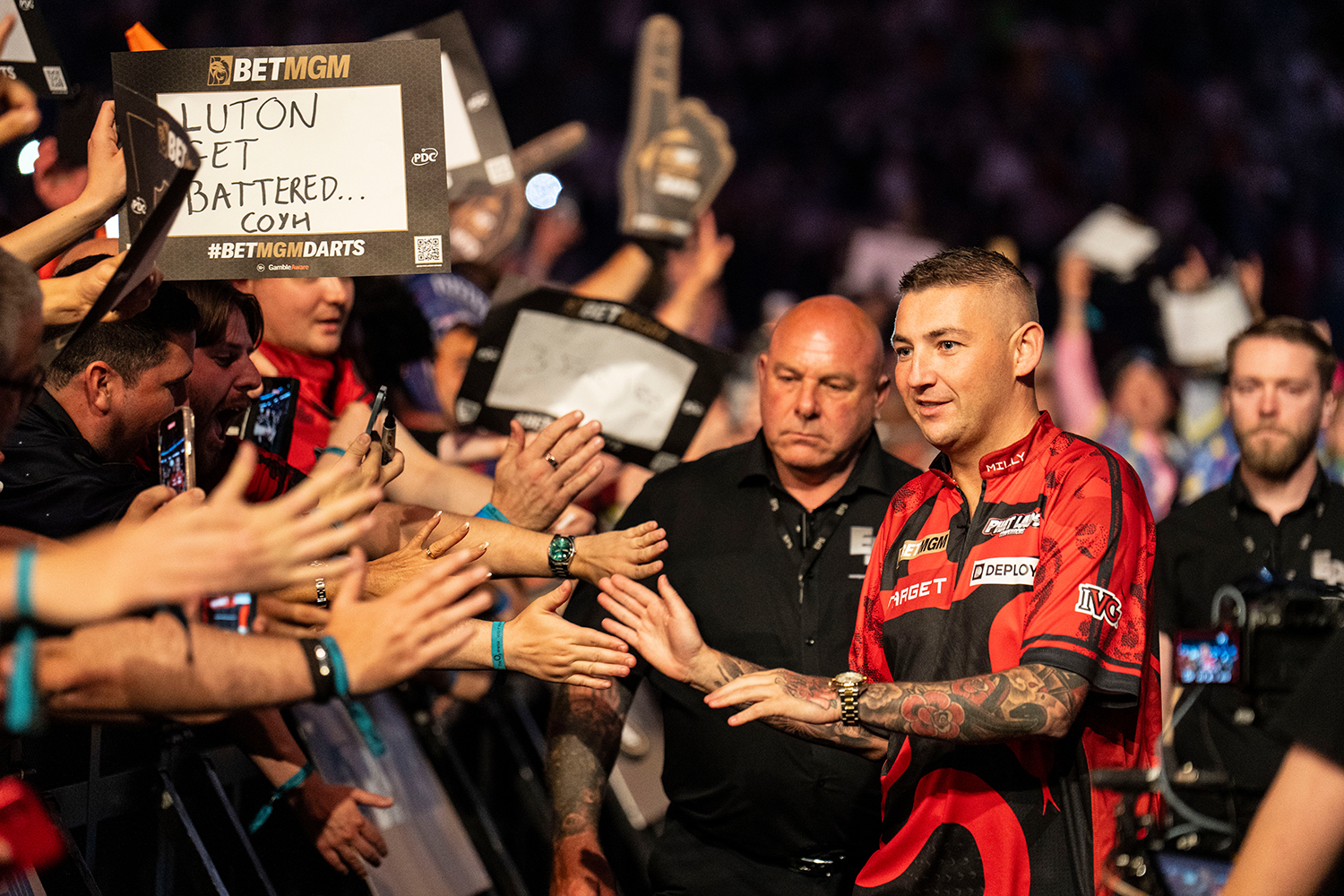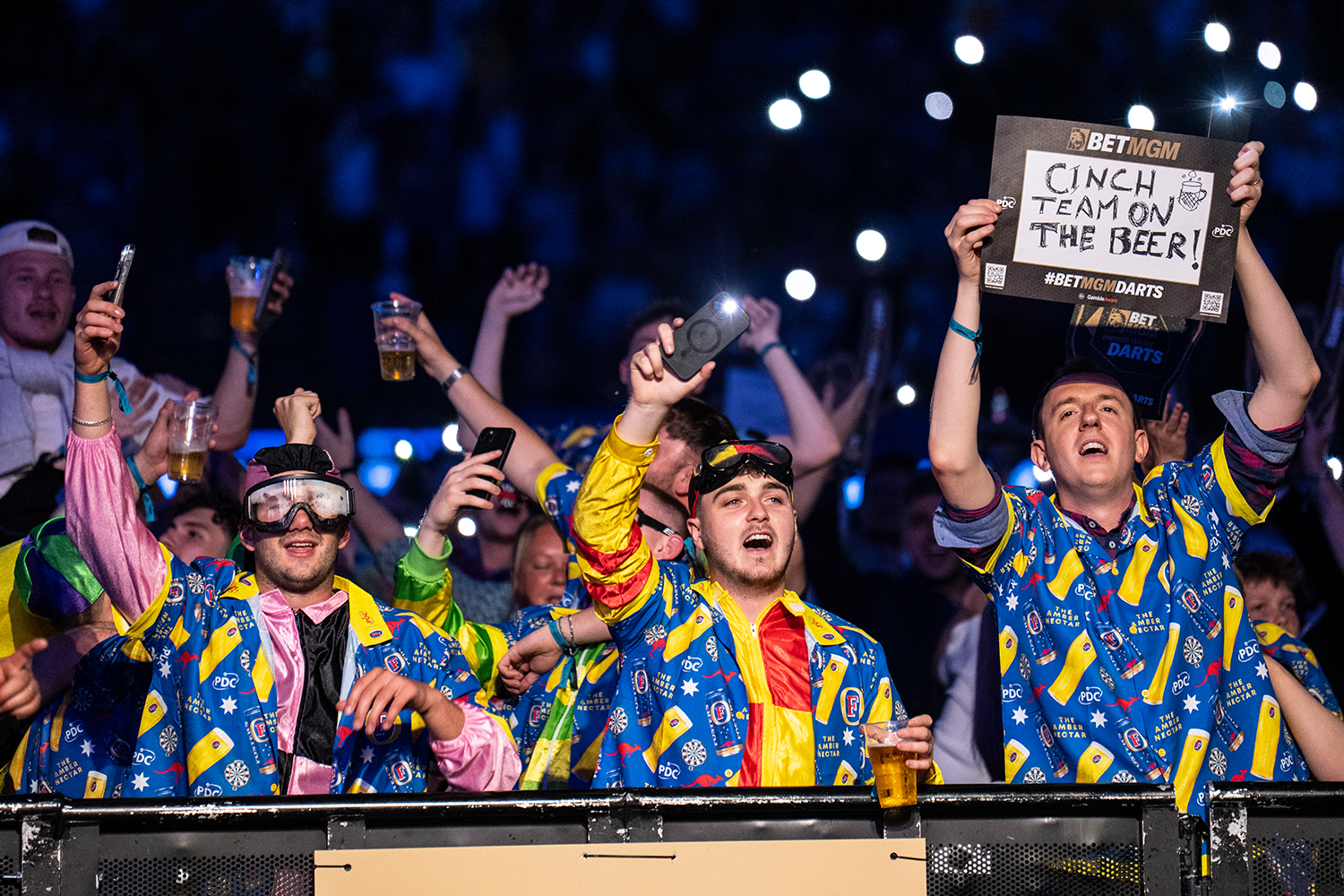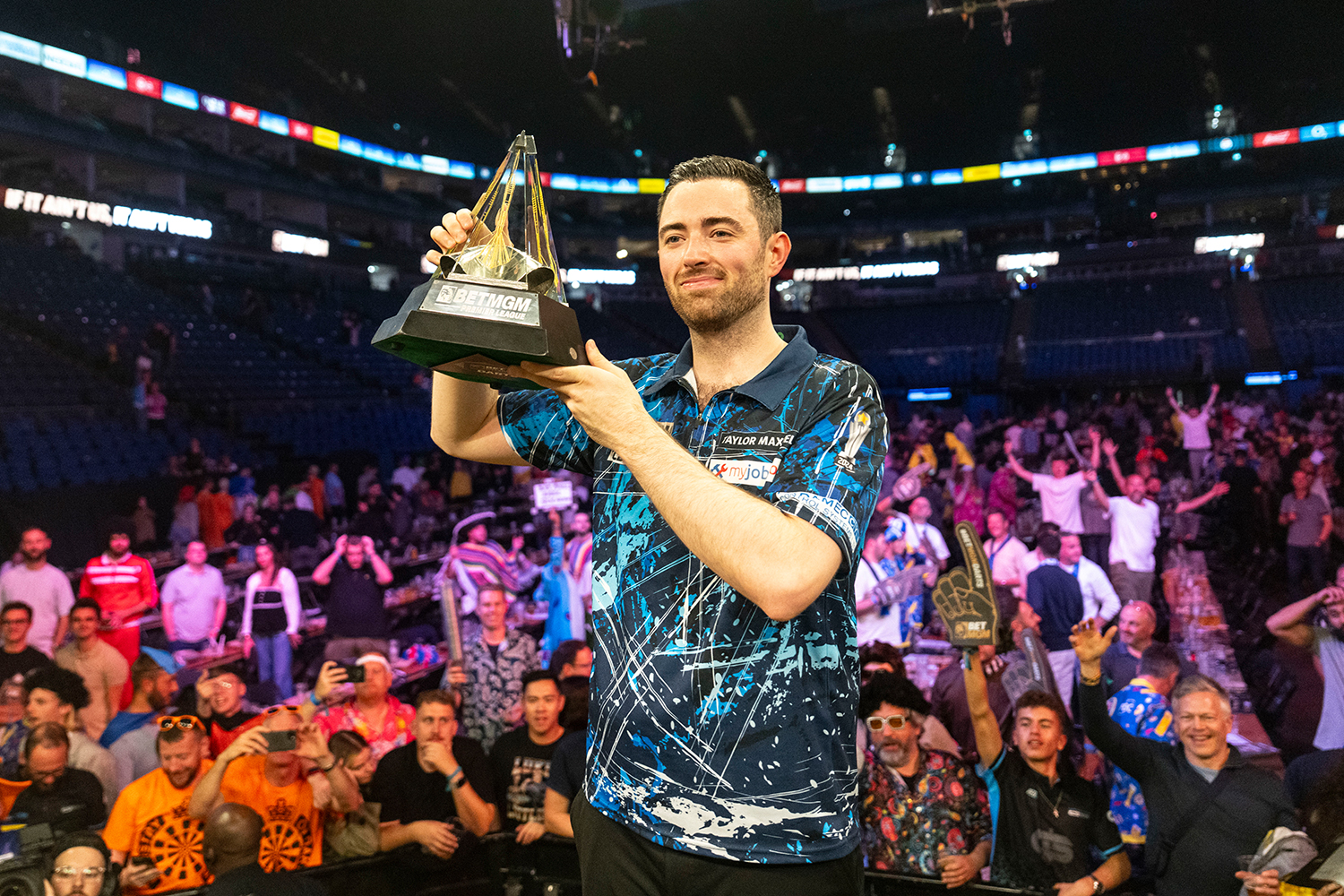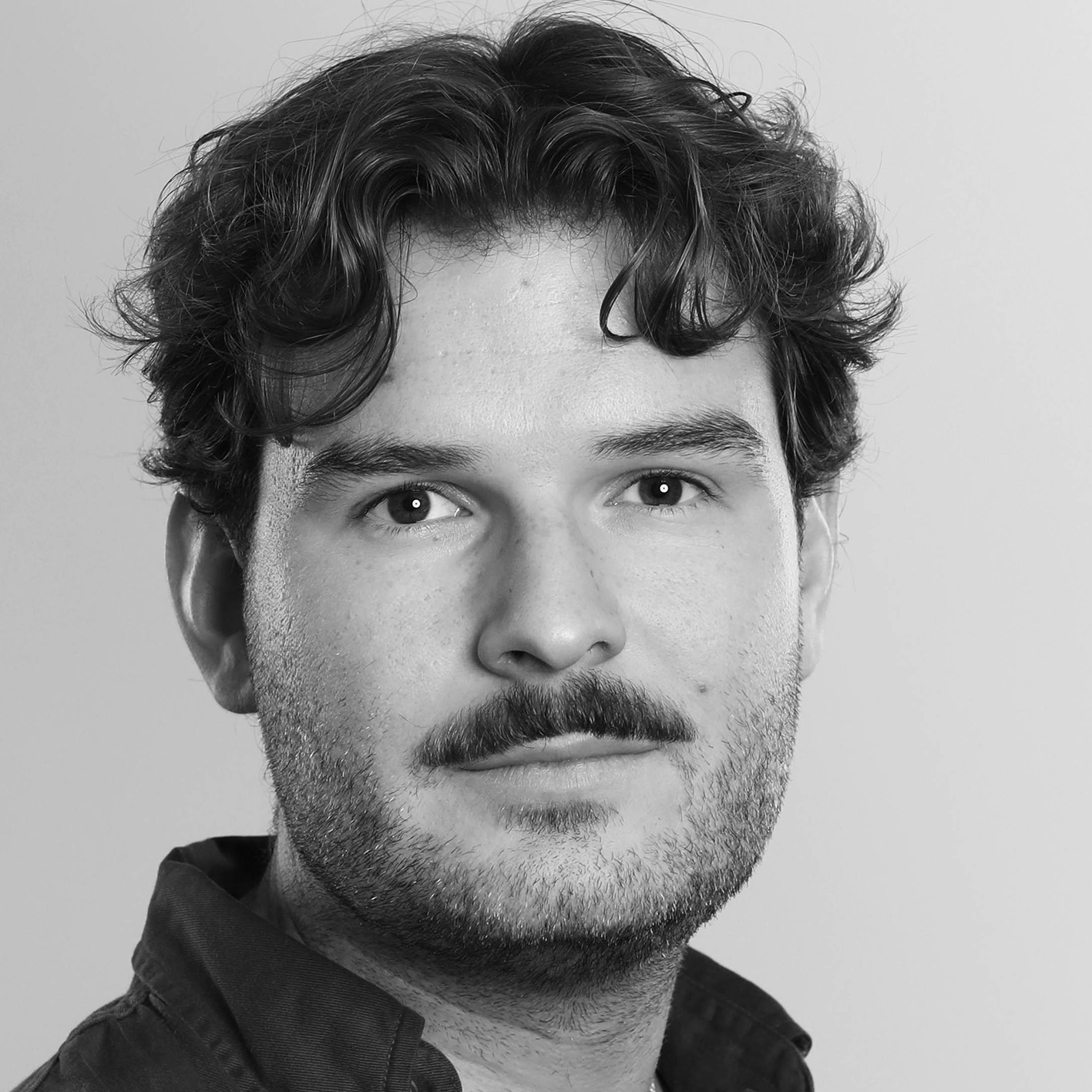Photographs by Antonio Olmos
Two unconvincing popes waddle past three even less convincing nuns. A mob of traffic cones drink lukewarm Italian lager and sweat profusely. An endless tide of Super Marios and Ali Gs, of human dartboards and human billboards, drawn to an endless sport. This is the O2, but from Berlin to Bahrain, Welford Road to Wollongong, Madison Square Gardens to Manchester, we could be anywhere.
Darts has become the sport that never sleeps and never stops, with Premier League finals night a rare definable peak to this windowless, airless, breathless travelling circus of socially acceptable hedonism.
Every Thursday for the previous 16 weeks, the same eight men have played mini-tournaments across Europe, with the top four from the resulting league here. World No 1 Luke Humphries, who beats 18-year-old world champion Luke Littler 11-8 in a scratchy final, said he gets bored from about night eight (Newcastle) to 12 (Liverpool), but then it picks up again. Some lower-ranked players criticise the perceived monotony, but darts has long stopped being about the players. Fans show no signs of such boredom.
There were 14,000 people at the O2 to watch Humphries win £275,000, taking his two-year earnings from darts alone above £2 million. Every Premier League night sold out, many instantly. The total prize money for Professional Darts Corporation (PDC) events – the promotion company turned de facto governing body – is increasing from £18m to £25m next year, with the World Darts Championship now worth £1 million to the winner. The most recent Sky Sports deal, agreed in February, doubled in value to £125 million over five years. The last two Alexandra Palace world finals have been Sky’s most-watched non-football events of the year.
And so some of this might sound like criticism, but I too stand up because I love the darts. The relentless homogeneity is sometimes held up as a failing, yet this is sport repackaged as immaculately presented comfort TV, as a big night out for live crowds who can’t see the board. It’s a perfect monoculture entertainment for a siloed modern world, a veritable dopamine fest of ASMR satisfaction and genuinely elite competition.
Once someone contracts the darts, there is no escape. This thing is catching at a rate most plagues would envy
Once someone contracts the darts, there is no escape. This thing is catching at a rate most plagues would envy
The PDC president and darting impresario Barry Hearn calls his pride and joy “the big spider web of the world”. He is aiming to put on four televised events in the US next year, and one in Canada. A Chinese Pro Tour has just launched, and darts is on the school curriculum in Bahrain. It is increasingly classless, genderless, ageless. Once someone contracts the darts, there is no escape. This thing is catching at a rate most plagues would envy.

Many of us are paralysed by the spectre of overwhelming choice and possibility, drowning in recommendations and reviews, but you know what you are going to get at the darts. Originality is out of fashion. It is half the price of the theatre and drinking in view of the action is encouraged. There are the same characters and commentators, the same football chants, the same silly shirts masking serious sport and the stench of stale beer. The two best current players by a distance, Humphries and Littler, reached the final for the fourth consecutive Thursday. This consistency is the brand, sameness as a selling point, the McDonald’s model translated into tungsten.
For all the increasing complaints about overly unmanageable, hostile crowds – if anything, the O2 horde are too heavy-handedly supervised – perhaps the greatest threat to darts’ infinite proliferation is not from spectators, but from the players. On Wednesday afternoon, in a whitewashed locker room that wouldn’t look out of place in a local school, the main topic was retirement. Nathan Aspinall, the world No 9 and Littler’s closest friend in darts, had suggested that the boy king could retire within the next five years.
And so Littler, who would be mid-A-Levels in another life, had to confirm: “It’s crazy to even think about retiring at the minute.” He has always dreamed of being a Twitch streamer, but he already gets to do that on the side. He reckons he will still be here in 10 years, when he would still be younger than the rest of the world’s top 16 are today.
Newsletters
Choose the newsletters you want to receive
View more
For information about how The Observer protects your data, read our Privacy Policy
But Aspinall’s prediction wasn’t created in a vacuum. Littler has long complained about travel and scheduling demands. He said last week he was smiling because the Premier League was almost over. He has pulled out of the past three Euro Tour events and hasn’t played on the Pro Tour – which isn’t televised – since 9 April. Practice is already a rarity. He is too old for this, and it has only just begun.
Humphries has taken time out for mental burnout twice in the past six months, and said on Wednesday “a lot of players struggle with it”. Littler, Humphries and 2021 world champion Gerwyn Price, an ex-Welsh rugby player who runs a fish and chip shop on the side, all mention the need for “balance”. Of course, balance doesn’t satiate the content machine.
In his autobiography, tennis star Andre Agassi wrote about the psychological impact of living on tour, calling hotels “just another version of what I call Not Home. The non-place we exist as athletes”. At least he got to play outside. Littler could go days without seeing the sky, weeks only spending a night or two in his own bed. Darts thrives in a non-place, so sheltered from reality that even a draught across the stage throws the final into relative disarray.

Beau Greaves, the world’s best female player, has played 198 competitive matches this year. Littler has played 91, Humphries 84. Sometimes they play five days a week in three different countries.
It might not be physically exhausting, but the mental strain is colossal. Stuffing their mouths with cash helps, but everyone has a breaking point. And unlike most other sports with an unending supply of willing fodder and new faces, darts relies on the same name-brand players. The top 16 players and those on the fringes of winning a Tour Card, darts’ golden ticket, are most profoundly affected.
“The calendar is absolutely obscene,” Aspinall said. “For us to take a weekend off, I have to pull out of events. I’m losing ranking money, because I just need a few days off.
“If the money gets to golf level, there’s no way people are doing this for 25 years.”
Somewhere in all this it becomes clear that what players value most is not playing darts. Aspinall’s reward for victory would be pulling out of this weekend’s European Tour event. He is knocked out in a semi-final of extraordinary quality by Humphries, so flies to Leverkusen on Friday. Now 33, his retirement stance is clear: he is out at 45, “skint or not”. He doesn’t even particularly like darts. He dreams of selling up and opening a beach bar.
Then there’s the dartification of other sports, everyone tearing off their slice of success. Snooker, tennis and even golf are battling with darts-esque behaviour from their crowds. “Everyone’s obsessed with darts at the moment,” as Aspinall puts it. It is eating everything around it, but how much more is there to consume before it has to start eating itself?
Ninety minutes into his post-final duties, Humphries contemplates a question about the schedule, despite wanting a beer more than perhaps anyone else alive.
“Yeah, it’s relentless,” he said. “But next year it’s going to be even busier.”

